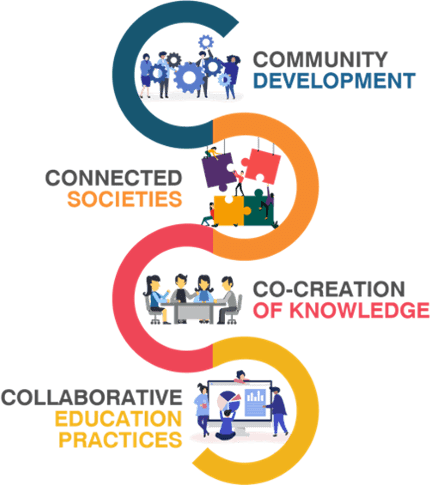SE4Ces:
Joining Social Economy Forces towards Community development, Connected societies, Co-creation of knowledge and Collaborative education practices.

With greater levels of uncertainty, social inequalities and unemployment as a result of economic and socio-political forces, Social Economy has proven to be part of the solution to address the needs of people to create stable employment and promote social inclusion. Providing a workforce of over 19.1 million, Social Economy has a major capacity to create stable employment with high returns in the economic but more importantly the social sphere. Yet, its potential remains untapped. At the same time, education on Social Economy in Higher Education Institutions (HEIs) is still largely absent. Where it does exist, it remains largely theoretical, failing to connect students with their communities and real-world learning experiences.
"SE4Ces" is a Knowledge Alliance seeking to create an enabling environment for the Social Economy to thrive by promoting closer partnerships between Higher Education Institutions active in Social Economy, Social Economy organisations and enterprises, as well as community stakeholders.
Financed under Erasmus+, the project seeks to:
- Provide an overview of the current Social Economy education landscape and analyse the needs in training and skills in SE organisations
- Pilot Social Economy Living Labs in 4 EU countries – spaces for interaction, collaboration and knowledge co-creation connecting HEIs, students, organisations and communities
- Bridge the gap in supply and demand of SE education and skills by building up an international Masters programme on Social Economy and Community Development Strategies.
Educational material developed in the project will be freely available online on an open source platform.
The Project will facilitate moving beyond existing traditional models of teaching and learning in the field of SE and suggest alternative models of teaching using community-centred, cooperative approaches that are at the heart of the overall philosophy and principles of Social Economy. Such approach aims to improve collaboration, employability and citizen engagement, but most importantly act as a catalyst for Social Economy and its potential for European societies and beyond.
Lasting 36 months, SE4Ces Knowledge Alliance brings together 10 partners, including:
- Higher Education Institutions: Aristotle University of Thessaloniki (GR), University of Essex (UK), University of Bologna (IT), Autonomous University of Barcelona (ES);
- Social Economy organisations: Cooperatives Europe (BE) A.I.C.CO.N (IT) FEBEA (BE);
- and Research and Training Institutions: Stimmuli for Social Change (GR), AN.KA SA (GR).
The project counts further 12 associated partners.
SE4Ces Knowledge Alliance will be seeking interested parties to sign a Memorandum of Understanding, committing to implement the International Masters programme.

